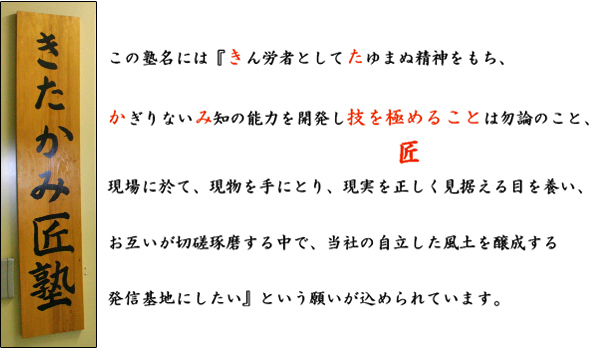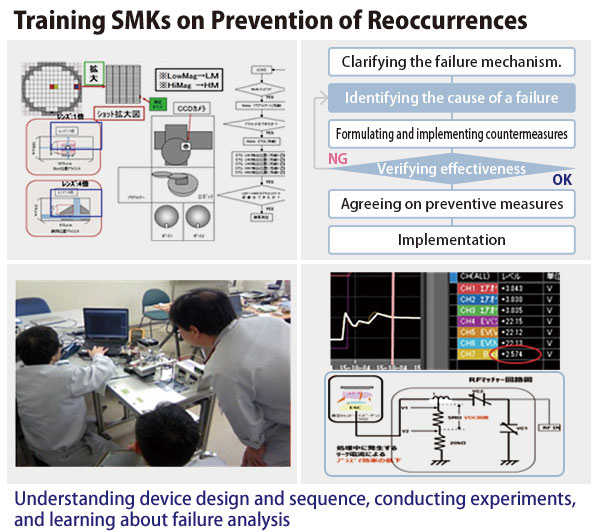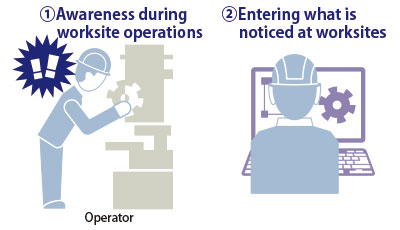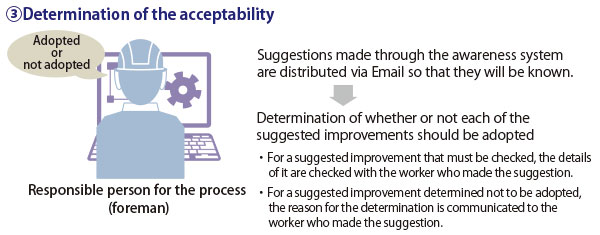Refined manufacturing power
Manufacturing power of Japan Semiconductor
Iwate Operations and Oita Operations of Japan Semiconductor Co., Ltd., have been manufacturing semiconductors since 1973 and 1970, respectively. With the expertise and mindset about manufacturing that we have been cultivating for more than 40 years, we are carrying out improvement activities every day particularly at our production sites. Inheriting this expertise and mindset, we will continuously make efforts to develop human resources and preserve the environment toward further enhanced manufacturing power.
Human resources development at production sites "Kitakami Craftsmanship Class"

Kitakami Craftsmanship Class provides production-line personnel with several-month courses on role-by-role and level-by-level bases with the objective of enhancing their skills and knowledge. With some courses that include tours for observing other companies and with opportunities for trainees to rethink what they think is correct is really correct, Kitakami Craftsmanship Class provides activities that allow the trainees to have another look at manufacturing from a wide perspective.
Course example
| Common lessons | ||
| Specific courses | ||
| Unit | Time | |
|---|---|---|
| Orientation | 2 | |
| Lecture | Lecture by director | 1 |
| 1 | ||
| Mechanical drawing |
|
24 |
| Electricity and electrical drawing |
|
24 |
| Expert knowledge | IE training | 80 |
| Small-group training | 8 | |
| Safety training and CSR | 4 | |
| Environmental education | 2 | |
| Power equipment | 4 | |
| MI training | 8 | |
| Quality training (SPC management enhancement) | 4 | |
| VA training | 48 | |
| Problem solving | ||
| TWS - Providing the workplace with a positive atmosphere | 4 | |
| Showing how to do a job | 4 | |
| ◇Entire-process training | 4 | |
| Device implementation |
|
140 |
|
16 | |
| Factory tour | Tour for observing a different company | 4 |
| 2 | ||
| Total | 334 |
| Unit | Time | |
|---|---|---|
| Orientation | 2 | |
| Lecture | Lecture by director | 1 |
| 1 | ||
| Expert knowledge | Analysis tool - Cross-section SEM/ PRESTIGE | 40 |
| Information, data collection, investigation, and analysis | 8 | |
| System-Tool | 8 | |
| Quality training, DRBFM, and hands-on training based on why | 32 | |
| Seven QC tools - FMEA | 4 | |
| Overview of AT work(CATCH/PCR) | 8 | |
| Basic and advanced levels of statistics | 40 | |
| Yield analysis | 8 | |
| Product process | 8 | |
| Device principles | 8 | |
| Through process | 8 | |
| Expert knowledge | Small-group training | 8 |
| Small-group training (drawing system) | 4 | |
| Safety training and CSR | 4 | |
| Power equipment | 4 | |
| Environmental education | 2 | |
| TWS - Providing the workplace with a positive atmosphere | 4 | |
| Showing how to do a job | 4 | |
| TSV process - actual machines and lines | 4 | |
| TSV process | 4 | |
| VA and problem solving | ||
| Factory tour | Tour for observing a different company | 4 |
| 2 | ||
| implementation | Improving processes | 114 |
| Total | 334 |
Comments by trainees who completed the craftsmanship class
"I would like to face daily problems based on the fact finding principles and work on them until they are solved" so that these efforts will lead to manufacturing of devices without producing defectives or without failing to meet deadlines."
"I have learned the importance of communication, let alone skills. I experienced that listening to views of coworkers had widen my sphere of knowledge, which had offered me a clue to the solution to problems from a different perspective."
Comments by trainees who completed the craftsmanship class six months ago
"I have noticed something that I would have not noticed before. I have come to question something that I was doing before without questioning it and then discussed and analyzed this matter with group members, which resulted in more stable working hours and higher efficiency. I would like to continue to raise issues toward reduced downtime and more stable operation."
"Now, at the time of the quality (accuracy) check after the activation of production equipment, I can not only make pass/fail determination but also work on trend analysis based on the results, allowing me to notice even a small change."
Development of special machine keepers (SMKs)
Aiming to further raise the level of the machine keepers (MKs), who are responsible for maintaining production equipment, we are training them to deepen their understanding of device design and sequence with the objective of upgrading refurbishing (recovery from failure and component replacement) to repair (failure analysis for problem solving).

Comments by SMK trainees
" At the workplace, I will practice the failure/defective analysis and quantitative analysis to identify the true causes of failures toward zero failures."
"I have learned that it is important to perform equipment failure analysis based on numeric values and that analyses, if quantified, can be used to counter troubles in the future."
Promotion of improvement activities - Awareness system
We have developed an awareness system—a mechanism that allows production-line workers to suggest improvements that they have come up with during operations. With this system, we are building a framework that prevents us from overlooking improvement opportunities noticed by workers.





































